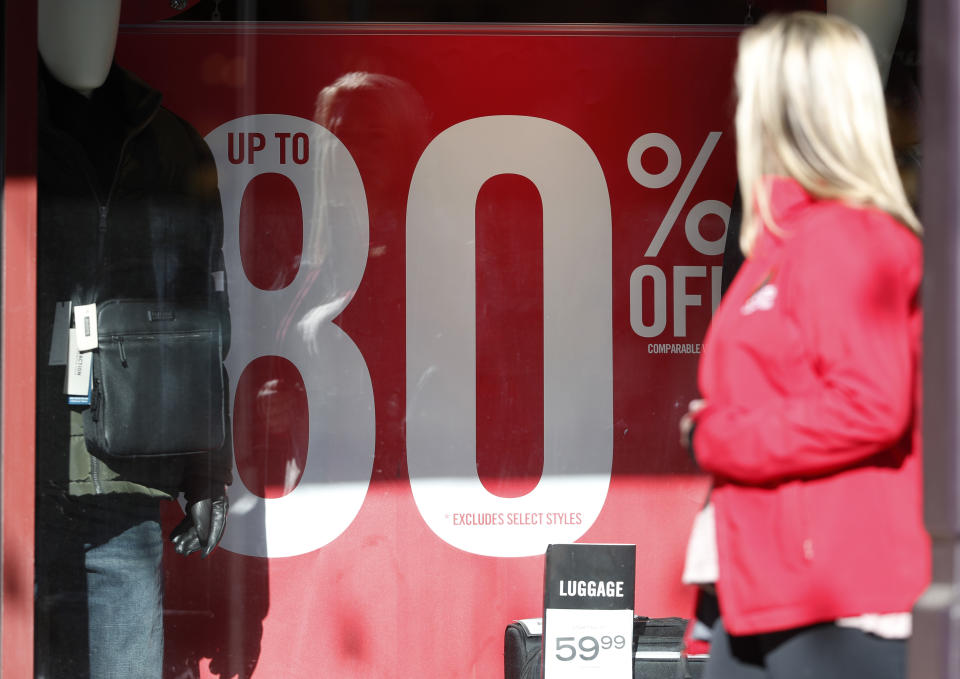Here's what may ruin the holiday season for most retailers
The last thing that a nation of largely struggling brick-and-mortar retailers need is a shortened holiday shopping season.
Alas, that’s exactly what Santa will be bringing the likes of Macy’s (M) and J.C. Penney (JCP) (among others) for the holidays — much to the dismay of the beancounters back at corporate praying as always for big fourth quarter profits. There are only 26 days between Thanksgiving and Christmas this year compared to 32 days in 2018. The wide difference, Goldman Sachs points out, tends to happen every five to six years because the date of Thanksgiving changes annually to fall on the fourth Thursday of November.
Most recently, this holiday calendar dynamic transpired in 2013, 2008, 2002 and 1996.
What this means for retailers is straightforward and potentially unfortunate. For starters, it gives shoppers fewer opportunities to buy gifts before Christmas. Shoppers love to buy merchandise on sale during Black Friday and then return in the days before Christmas to perhaps load up on more gifts. Retailers gladly accept their greenbacks amidst that binge.
Given the calendar shift though — as it’s known on Wall Street — that probability of shopper double-dipping on gifts falls.
Secondarily, it’s likely to cause retailers to go all out with their discounts in an attempt to capture traffic early on in the shopping season. In turn, that could very well cause a sea of profit margin busting sales across the mall and online.
In such an environment nobody truly wins — but the biggest, financially healthiest players such as Walmart (WMT) and Target (TGT) will probably take the cake. The two large discounters are able to offer the best discounts because they get great deals on their merchandise and can drive steady holiday season traffic as each sells groceries. Apparel retailers like Polo Ralph Lauren and accessories purveyors in Michael Kors could easily be swept up into the propensity of their department stores accounts to discount items during the calendar shift.

Researchers at Goldman Sachs have found that calendar shifts are not to be ignored by investors in the retail space. Excluding the 2008-2009 shorter holiday calendar period due to the impact on spending from the financial crisis, holiday sales exceeded back-to-school sales (August-September) in the most recent shifted 2013 period, but came up short in 1996 and 2002.
But 2013 wasn’t gangbusters by any stretch of the imagination for retailers. A sluggish macroeconomic environment caused by a payroll tax hike and a $5 billion reduction in food stamp benefits stunted sales at Walmart, Target, Best Buy, Dollar Tree and Dollar General.
While the U.S. economy is in a better place in contrast to 2013, the calendar shift is still likely to wreck mild havoc on retailers.
“Although recent spending momentum seems supportive of a healthy holiday season in 2019, our analysis points to potential headwinds from a shorter holiday calendar,” Goldman Sachs retail analyst Kate McShane writes.
Brian Sozzi is an editor-at-large and co-anchor of The First Trade at Yahoo Finance. Follow him on Twitter @BrianSozzi
Read the latest financial and business news from Yahoo Finance
Coca-Cola making its biggest change since 1892 and investors love it
How the Wendy's Baconator will help unlock $1 billion in new sales
Follow Yahoo Finance on Twitter, Facebook, Instagram, Flipboard, SmartNews, LinkedIn, YouTube, and reddit.
